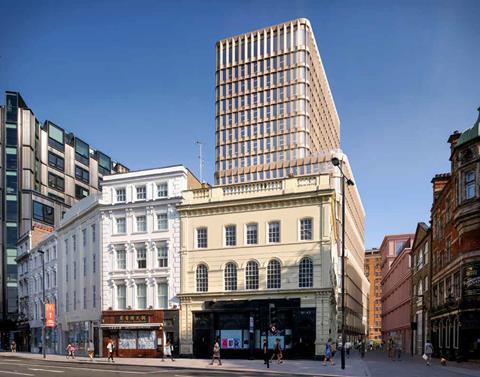Campaigners to appeal decision after judge finds outcome would be the same regardless of claimed planning policy breach

The High Court has refused an attempt by campaigners to bring a full judicial review against the decision to approve a DSDHA-designed office tower near the British Museum.
BC Group’s 19-storey One Museum Street scheme was approved by Camden council last year despite being opposed by Historic England, the Georgian Group, Save Britain’s Heritage and the London School of Economics.
The plans, set for a mostly mid-rise area of Bloomsbury, also received more than 500 letters of objection from locals including film-maker Mike Leigh and Victorian Society president Griff Rhys Jones.
Architect and veteran campaigner James Monahan launched a judicial review of the scheme in May, claiming it had not adhered to requirements within national planning policies, the London Plan and the borough’s own local planning policies.
More than 60 supporters attended an initial two-and-a-half hour hearing which took place earlier this week at the Royal Courts of Justice on the Strand, with the court having to open up an upper gallery to make room for the unexpected number of attendees.
While the judge agreed with part of the campaigners’ arguments, she then used Section 31 of the Senior Courts Act 1981, which states that the application should be refused if the outcome would have been the same regardless of a breach of policy, to quash the case.
Monahan has decided to appeal the decision, claiming that the tower would mark the “beginning of the end for Georgian Bloomsbury” if it goes ahead.
He added: “Senior Camden politicians give every indication that they do not care about Bloomsbury but are hell-bent upon transforming this historic area into a new Canary Wharf.”
The campaigner has argued the tower would damage the setting of the Bloomsbury and Covent Garden conservation areas and the nearby grade I-listed British Museum, Bedford Square and Nicholas Hawksmoor’s St George’s Church.
The mixed-use scheme would replace the 1960s Selkirk House, a 17-storey former Travelodge hotel, with 44 homes and 22,650 sq m of office space. It would also include three six-storey buildings and one five-storey block containing housing and retail space.
The judicial review is the latest bid launched by Monahan, who was part of a campaign to stop plans to redevelop parts of Covent Garden in the 1970s and 1980s.
Prior to last year’s decision to approve the scheme, Monahan, whose practice Monahan Blythen Hopkins Architects is based on Clerkenwell Road, proposed an alternative approach for the site which would see the existing Selkirk House refurbished and neighbouring buildings restored. This was not taken into consideration by the council.
The approved scheme is the third incarnation of the proposals, following earlier plans by DSDHA for a 21-storey tower on the site which were revised.
Historic England said the latest plans would still exacerbate the “visual discordance” caused by the existing building in views of the nearby historic buildings due to the proposed tower’s height and bulk.
Save Britain’s Heritage objected to the proposals because of the impact of the tower element, which is 20m higher than the existing tower, and also what it described as the scheme’s “substantially harmful and disproportionate” carbon cost.




























No comments yet